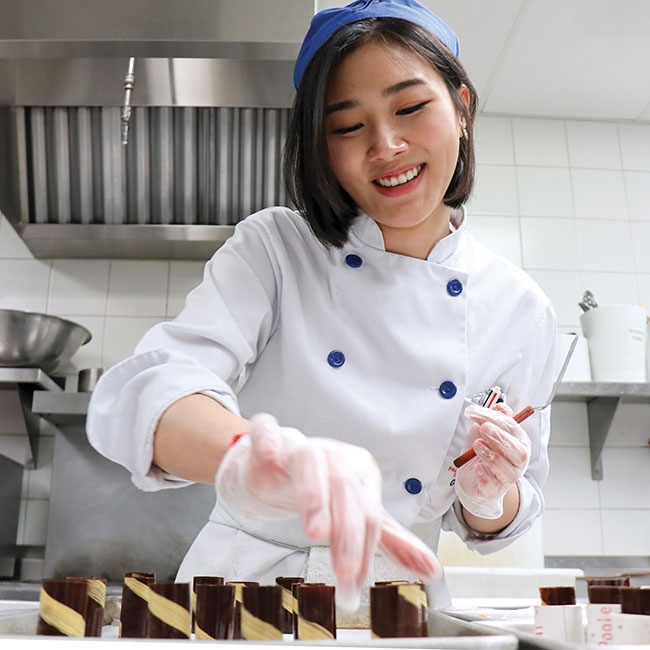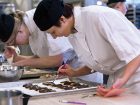
Taste for knowledge
August 19, 2019
By Emma Bell
What do culinary schools offer students?
 From bread-making to confectionery and patisserie, students need a wide range of skills. Image courtesy of the Pacific Institute of Culinary Arts
From bread-making to confectionery and patisserie, students need a wide range of skills. Image courtesy of the Pacific Institute of Culinary ArtsCanada’s baking and pastry schools need to offer the best learning opportunities possible to remain competitive and attract talent. Today’s students are looking for high quality instructors, state-of-the-art classrooms and labs, flexible learning options, specialized courses, apprenticeship and networking possibilities to give them a competitive edge in launching their careers. From coast to coast, Canada’s baking schools offer a wealth of options.
Aron Weber has been a Pastry and Baking Arts Instructor at the Southern Alberta Institute of Technology (SAIT) in Calgary for six years. When he started off as a student in a culinary program in British Columbia, he soon switched into the baking stream after the pastry chef took him under his wing and helped him discover baking as his true passion. It’s that very mentality of “find your passion,” says Weber, that all SAIT instructors aim to pass on to students in the school’s two-year baking diploma program.
Weber says one of SAIT’s most popular courses is cake decorating. Many students often arrive inspired by cake creations they see on Instagram and television competition shows, and want to try their own hand at the craft. Because of this course’s popularity and student demand, SAIT will be offering a specialized 15-week cake decorating course as of 2020 for students who want to exclusively focus on the art. Notably, the school also offers a Special Projects class, which focuses on creating spectacular desserts for events, which can range from an annual harvest dinner to a weekly dessert buffet.
From his experience, what Weber sees as a trend in Canadian baking schools is a push towards getting out of the classroom and gaining hands-on experience through an apprenticeship or co-op placement. Like a number of the country’s top baking programs, SAIT offers a Restaurant class, which Weber describes as a big “eye-opener for students”. The bakers-to-be have the chance to get direct experience preparing à la carte, fine dining and dessert services at a busy restaurant setting in downtown Calgary.
SAIT prioritizes staying on top of trends in the baking world. Since 2016, SAIT and other Western Canada baking and pastry programs have held annual conferences, with each school taking a turn playing host. Faculty from each program present on a variety of relevant topics related to the industry. Each conference also includes a tour of the host’s facility as well as visits to local bakeries, enabling the instructors to pass along valuable industry information to students.
At the Pacific Institute of Culinary Arts in Vancouver, students can opt for professional training programs with a variety of schedules to suit their life. There are combined baking/culinary one-year and two-year programs, as well as a six-month baking diploma or a three-month baking certificate, all of which are full-time. “Apart from our professional training programs in the Baking & Pastry Arts, our ‘Basics in 8’ program is very popular for those who love baking,” explains Sylvia Potvin, the school’s Proprietor of Special Projects. The course takes place over eight consecutive Saturdays and is a skill-building series covering everything from bread-making and lamination to custards and creams. “I believe it has a very approachable format for home baking enthusiasts with lots of information and without overloading anyone,” says Potvin. She adds that another popular class is their sourdough. “Vancouver loves sourdough!”
With a maximum student to instructor ratio of 15:1, Potvin says that staff can respond to requests and feedback from students very efficiently. “As we are a small training academy, we are able to get to know our students intimately and are able to enrich their education on a personal level,” she says. “Having access to top quality ingredients and produce in Vancouver gives us the advantage of being able to utilize local, ingredients so we can stay seasonal.”
At Toronto’s George Brown College, there are two avenues to learn baking, either through full-time studies or Continuing Education. If students plan to study full-time, they can opt for a two-year Baking and Pastry Arts Management diploma, or a one-year certificate in Baking Pre-Employment. Jennifer Lakhan-D’Souza, program coordinator for the one of the full-time programs, explains that the college also offers a post-graduate French Pastry program for those that wish to learn more advanced pastry skills, which requires a semester studying and working in French.
On the other hand, George Brown’s Continuing Education (CE) courses are for those who wish to study baking as a hobby or are currently working and want to take classes outside of ‘nine-to-five’ hours. The general baking courses in the Baking Arts certificate, which cover essentials like pies, cookies and cakes, tend to be the most popular. The newest class in the CE program is Asian desserts, where students can try their hands at sweets like mochi, Japanese cheesecake and bubble tea. Other classes that tend to fill up are the specialized courses that run during the holidays and focus on seasonal baking. In addition, the school offers workshops based on student feedback and requests, such as sculpted cakes and macarons.
“While we may not teach how to make fad items such as the cronut, students’ education with us will give them the knowledge and skill to produce such items,” she explains. “We inject skills and subjects into the curriculum where we see trends are becoming more mainstays, for example, gluten-free baking.”
In general, the instructors must have a minimum of 10 years of industry experience and must be Red Seal certified before being able to teach at George Brown. The students, says Lakhan-D’Souza, come from every facet of life. Some are straight out of high school, and others have already attended other post-secondary institutions but want to make a big change. “We get many mature students looking to change careers and we also get students from all over the world. Our full-time programs are made up of approximately 20 per cent international students coming to us from all over the world including Asia, India and South America.”
And what draws students to George Brown? According to Lakhan-D’Souza, the school’s downtown Toronto location makes it convenient for students from across the GTA. “Our programs are very well established,” she says. “Our Centre for Hospitality opened in 1987 with state-of-the-art bake specific facilities. We have amazing relationships and support from our industry partners which allows us to stay current.”
At Humber College in Etobicoke, “students are usually drawn to the courses that allow them to be artistic and creative, such as cake decorating and dessert plating,” says faculty member Susan Joseph. “We stress skill development, but there is no feeling like executing your first professional looking cake and getting positive feedback from friends and family.”
According to Joseph, the program receives a diverse group of students each year. “There are always students that come straight from high school, but there are also many mature students who have been in a non-rewarding career and are finally pursuing their passion for baking and pastry. We also have a growing number of International students who want to come to Canada for their education and hope to get the skills necessary to pursue employment here.”
One recent trend that faculty have noticed, based on classroom feedback, is that students want courses that are strictly industry related.
“We have specific courses where we study trends, brands, products and product development, but the majority of our practical classes involve skill development as opposed to recreating on-trend products and recipes. For instance, if a student learns how to make a perfect meringue, a perfect pastry cream and a perfect pâte sucrée, they can apply these skills to many different items,” says Joseph.
“ At this time, we have not needed to recruit much due to a high amount of interest in baking—hopefully our program will continue to thrive as we move into the future.”
Print this page


Leave a Reply